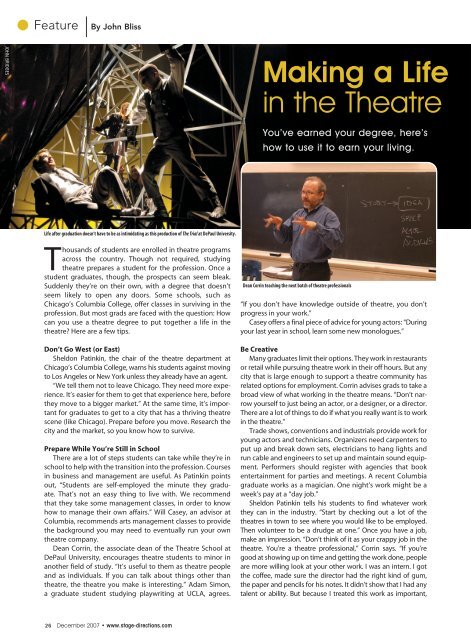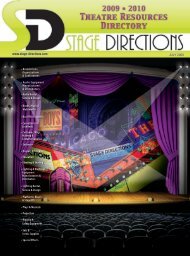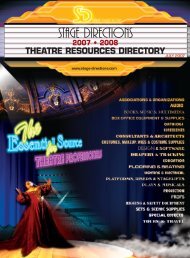Download a PDF - Stage Directions Magazine
Download a PDF - Stage Directions Magazine
Download a PDF - Stage Directions Magazine
Create successful ePaper yourself
Turn your PDF publications into a flip-book with our unique Google optimized e-Paper software.
FeatureBy John BlissJohn BridgesMaking a Lifein the TheatreYou’ve earned your degree, here’show to use it to earn your living.Life after graduation doesn’t have to be as intimidating as this production of The Trial at DePaul University.Thousands of students are enrolled in theatre programsacross the country. Though not required, studyingtheatre prepares a student for the profession. Once astudent graduates, though, the prospects can seem bleak.Suddenly they’re on their own, with a degree that doesn’tseem likely to open any doors. Some schools, such asChicago’s Columbia College, offer classes in surviving in theprofession. But most grads are faced with the question: Howcan you use a theatre degree to put together a life in thetheatre? Here are a few tips.Don’t Go West (or East)Sheldon Patinkin, the chair of the theatre department atChicago’s Columbia College, warns his students against movingto Los Angeles or New York unless they already have an agent.“We tell them not to leave Chicago. They need more experience.It’s easier for them to get that experience here, beforethey move to a bigger market.” At the same time, it’s importantfor graduates to get to a city that has a thriving theatrescene (like Chicago). Prepare before you move. Research thecity and the market, so you know how to survive.Prepare While You’re Still in SchoolThere are a lot of steps students can take while they’re inschool to help with the transition into the profession. Coursesin business and management are useful. As Patinkin pointsout, “Students are self-employed the minute they graduate.That’s not an easy thing to live with. We recommendthat they take some management classes, in order to knowhow to manage their own affairs.” Will Casey, an advisor atColumbia, recommends arts management classes to providethe background you may need to eventually run your owntheatre company.Dean Corrin, the associate dean of the Theatre School atDePaul University, encourages theatre students to minor inanother field of study. “It’s useful to them as theatre peopleand as individuals. If you can talk about things other thantheatre, the theatre you make is interesting.” Adam Simon,a graduate student studying playwriting at UCLA, agrees.Dean Corrin teaching the next batch of theatre professionals“If you don’t have knowledge outside of theatre, you don’tprogress in your work.”Casey offers a final piece of advice for young actors: “Duringyour last year in school, learn some new monologues.”Be CreativeMany graduates limit their options. They work in restaurantsor retail while pursuing theatre work in their off hours. But anycity that is large enough to support a theatre community hasrelated options for employment. Corrin advises grads to take abroad view of what working in the theatre means. “Don’t narrowyourself to just being an actor, or a designer, or a director.There are a lot of things to do if what you really want is to workin the theatre.”Trade shows, conventions and industrials provide work foryoung actors and technicians. Organizers need carpenters toput up and break down sets, electricians to hang lights andrun cable and engineers to set up and maintain sound equipment.Performers should register with agencies that bookentertainment for parties and meetings. A recent Columbiagraduate works as a magician. One night’s work might be aweek’s pay at a “day job.”Sheldon Patinkin tells his students to find whatever workthey can in the industry. “Start by checking out a lot of thetheatres in town to see where you would like to be employed.Then volunteer to be a drudge at one.” Once you have a job,make an impression. “Don’t think of it as your crappy job in thetheatre. You’re a theatre professional,” Corrin says. “If you’regood at showing up on time and getting the work done, peopleare more willing look at your other work. I was an intern. I gotthe coffee, made sure the director had the right kind of gum,the paper and pencils for his notes. It didn’t show that I had anytalent or ability. But because I treated this work as important,26 December 2007 • www.stage-directions.com
















